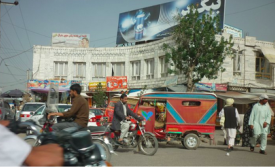central asia
Friends, relatives and business associates of Tajikistan's president are driving around in cars stolen off Germany's streets, according to the German government. German authorities have been attempting to raise the issue with Tajik officials since at least May, they confirmed Thursday after a German tabloid broke the story.

Right after I graduated from college this past May, I went on a bit of an odyssey. I took a trip to Afghanistan. After being away for three years, I returned to the western part of the country where my family resides. I was struck by how much things had changed for the worse in just three years. Three years ago, there was a lot of employment, a lot of optimism for the future, and an overall hope for a better life. However, this time, complete hopelessness, lawlessness, and uncertainty dominated the atmosphere. Everyone lived in a state of utter fear.
Though it has received comparatively little attention, one of the most profound geopolitical trends of the early 21st century is gathering steam: China’s pivot to Central Asia. As American military forces withdraw from Afghanistan and gaze toward the Asia-Pacific, and while Washington’s European allies put NATO’s eastward expansion on the back burner, Central Asia has become China’s domain of investment and influence.
On Friday leaders of Central Asian nations will meet at the Shanghai Cooperation Organization (SCO) summit in Bishkek, Kyrgyzstan. China arguably wields the most power of the countries involved, and the propaganda mills in Beijing are pumping out content hailing the importance of the upcoming meeting. In the end, though, what does it really mean for the Middle Kingdom?
At just 28 years old, Askar Baitassov has built the biggest restaurant business in Kazakhstan. Now he wants to introduce high quality Central Asian cuisine to the world. "I always dreamed of becoming rich by the time I was 25, so that I could buy myself a really expensive car," says Mr Baitassov. He is sipping on a blackcurrant drink at one of his numerous restaurants in Almaty, Kazakhstan's largest city and commercial centre.
Overall, the members of Della Mae demonstrated that they are among the best cultural ambassadors the U.S. has to offer, not only because of their immeasurable talent, but because of their ability to build relationships on a one-to-one basis.
ndia’s soft power in Central Asia, especially in Kazakhstan, the largest of the five stans, is enjoying a revival thanks to a new breed of Indian entrepreneurs. Forget Raj Kapoor, Nargis and Indira Gandhi. They now evoke smiles and a sigh. No matter a 15-year old Devushka (young girl) or a 60-something Zenshina (lady) are called Indira, Mira or Gita. Enter Balika Badhu and Shahrukh Khan in Jab Tak Hai Jaan.
While recently on a cultural diplomacy adventure across Central Asia on an American Music Abroad tour—the State Department’s flagship musical exchange program that American Voices administers—with the bluegrass band Della Mae, I had the opportunity to encounter the public diplomacy space that are the State Department’s American Corne







